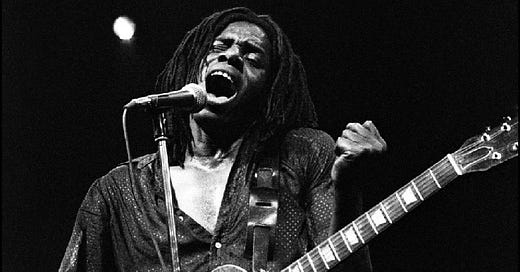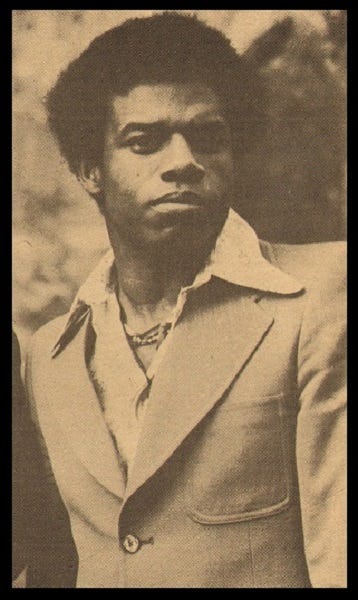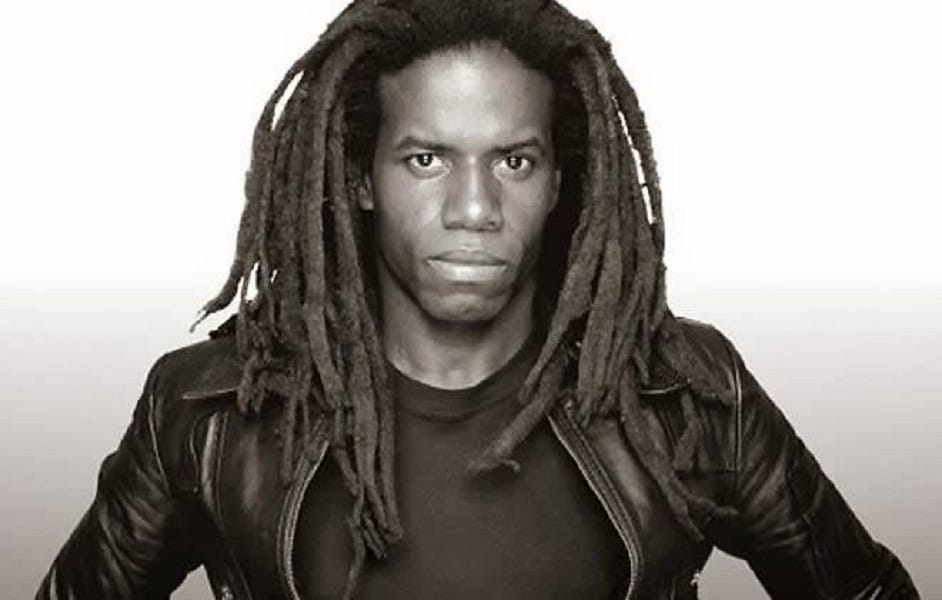Eddy Grant (born March 5, 1948) – Black Skin Blue Eyed Boys (1970)
This anti-war anthem that foretold a future free from racism was written by the great guitarist and singer/songwriter for his first group the Equals.
Watch video on YouTube
View most updated version of this post on Substack
Search our full archives
Eddy Grant is a singer/songwriter and guitarist originally from Guyana who moved to London as a teenager. He co-founded the 1960s British R&B/rock group the Equals and later rose to international fame as a solo artist.
Edmond Montague Grant was born in Guyana, at the time still a colony of the UK called British Guiana. At age 12, he moved to London to join his parents, where his father had been playing trumpet. He learned to read and write music in school, and took up the guitar after falling in love with Chuck Berry.
Grant became friends with classmates and fellow musicians John Hall and Pat Lloyd, and in 1964 the three of them formed a bi-racial R&B/rock group called the Equals. Grant was the group’s lead guitarist and primary songwriter, Lloyd was on rhythm guitar, Hall played drums, and brothers Derv and Lincoln Gordon were on lead vocals and guitar (although he later switched to bass), respectively.
They saw nine of their records hit the UK singles chart during 1967-71, including the #1 hit “Baby, Come Back” (1968), written by Grant. For their second album Explosion, released in December, 1967, Grant wrote the anti-police brutality message song “Police On My Back.” It was later covered by the Clash for their 1979 Sandinista LP.
The other song solely written by Grant for Explosion was the powerful global unity anthem “Give Love A Try.” It was their first single to chart, reaching #52 in the UK in 1968.
In September, 1969, the entire group was injured in a car accident in Germany. Grant was the most seriously hurt, and stopped touring with them, but continued to write songs for the Equals.
Their final chart success was “Black Skin Blue Eyed Boys,” a Grant-penned anti-war anthem that imagined a future free from racism. Released in late 1970, it reached #9 in the early weeks of 1971.
Around this time, Grant’s health problems worsened when he suffered a collapsed lung and heart attack and left the group for good, returning to Guyana for a while. They continued on without him but eventually disbanded in 1979.
Once he recovered and came back to London, Grant set up his own home recording facility in 1972, Coach House Studios. Two years later he founded Ice Records, distributed by Pye Records at first and later by Virgin. In 1975, he released his self-titled debut solo LP on Ice and another of his labels, Torpedo Records.
It featured the funky jam “Stone Cold Cat,” and the original version of “Nobody’s Got Time,” which two years later would be re-recorded as a vocal version and instrumental titled “Time Warp,” credited to the Coachouse Rhythm Section but written and produced by Grant. The latter would become a very influential dancefloor record thanks to DJ Larry Levan at the Paradise Garage.
Eddy Grant also contained the powerful, mostly acoustic closing cut “I Wish I Knew The Answer,” in which Grant asked questions like “Are we ruling by wisdom or ruling by force?” and “Wish I knew why the spacemen never saw God…wish I knew if it was just ‘cuz there just isn’t one?”
Grant left the UK again in the early eighties and settled in Barbados. His biggest-ever international hit “Electric Avenue” (1982) was inspired by his memories of TV coverage of London’s 1981 Brixton riots just before he left the UK. As he recalled in a 2018 interview:
“I’d watched the Brixton riots. People felt they were being left behind and there was a potential for violence. The song was intended as a wake-up call.”
Its single went to #2 in the UK and also became a #2 hit on the Billboard Hot 100 in early 1983 after MTV aired the track’s video in response to calls for more racial diversity on the channel. “Electric Avenue” was only kept out of the top spot by Michael Jackson’s mega-hit “Billie Jean.” The hot U.S. extended version went to #6 on dance charts, featuring uncredited remix work by pioneer disco DJ and remixer John Luongo.
On the single’s B-side was “Time Warp,” which was the funkiest song found in most U.S. jukeboxes for decades, when “Electric Avenue” was usually guaranteed to be among the available selections.
Happy Birthday to the great Eddy Grant.
Further info:
“Eddy Grant Sings,” The New York Times, August 11, 1983.
“Still going strong: the indestructible Eddy Grant,” The Independent (UK), July 10, 2008.
“How we made Eddy Grant's Electric Avenue,” interview by Dave Simpson, The Guardian, September 2, 2018.
#soul #funk #disco #electro #TheEquals #EddyGrant








